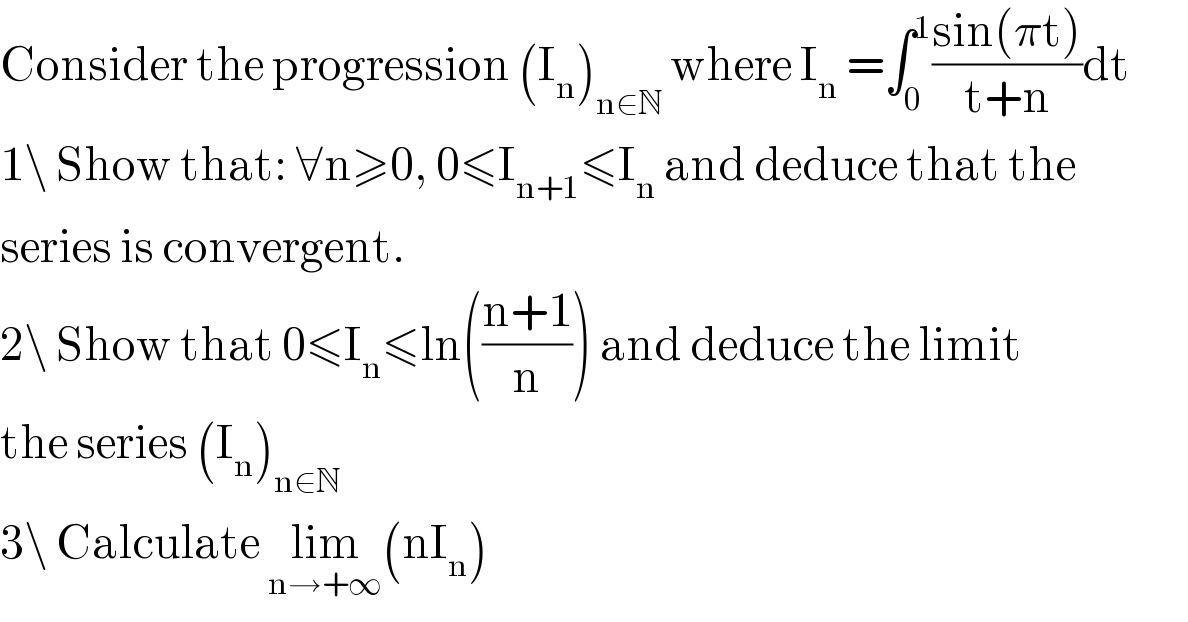Question Number 93860 by Ar Brandon last updated on 15/May/20

$$\mathrm{Consider}\:\mathrm{the}\:\mathrm{progression}\:\left(\mathrm{I}_{\mathrm{n}} \right)_{\mathrm{n}\in\mathbb{N}} \:\mathrm{where}\:\mathrm{I}_{\mathrm{n}} \:=\int_{\mathrm{0}} ^{\mathrm{1}} \frac{\mathrm{sin}\left(\pi\mathrm{t}\right)}{\mathrm{t}+\mathrm{n}}\mathrm{dt} \\ $$$$\mathrm{1}\backslash\:\mathrm{Show}\:\mathrm{that}:\:\forall\mathrm{n}\geqslant\mathrm{0},\:\mathrm{0}\leqslant\mathrm{I}_{\mathrm{n}+\mathrm{1}} \leqslant\mathrm{I}_{\mathrm{n}} \:\mathrm{and}\:\mathrm{deduce}\:\mathrm{that}\:\mathrm{the}\: \\ $$$$\mathrm{series}\:\mathrm{is}\:\mathrm{convergent}. \\ $$$$\mathrm{2}\backslash\:\mathrm{Show}\:\mathrm{that}\:\mathrm{0}\leqslant\mathrm{I}_{\mathrm{n}} \leqslant\mathrm{ln}\left(\frac{\mathrm{n}+\mathrm{1}}{\mathrm{n}}\right)\:\mathrm{and}\:\mathrm{deduce}\:\mathrm{the}\:\mathrm{limit} \\ $$$$\mathrm{the}\:\mathrm{series}\:\left(\mathrm{I}_{\mathrm{n}} \right)_{\mathrm{n}\in\mathbb{N}} \\ $$$$\mathrm{3}\backslash\:\mathrm{Calculate}\:\underset{\mathrm{n}\rightarrow+\infty} {\mathrm{lim}}\left(\mathrm{nI}_{\mathrm{n}} \right) \\ $$
Commented by mathmax by abdo last updated on 15/May/20
![1) I_n =∫_0 ^1 ((sin(πt))/(t+n))dt its clear that I_n ≥0 we have I_n −I_(n+1) =∫_0 ^1 ((sin(πt))/(t+n))dt−∫_0 ^1 ((sin(πt))/(t+n+1))dt =∫_0 ^1 sin(πt)((1/(t+n))−(1/(t+n+1)))dt =∫_0 ^1 ((sin(πt))/((t+n)(t+n+1)))dt ≥0 ⇒ ( sin(πt)≥0 on[0,1]) I_n is decrasing and minored by 0 ⇒ I_n is convergent.](https://www.tinkutara.com/question/Q93886.png)
$$\left.\mathrm{1}\right)\:{I}_{{n}} =\int_{\mathrm{0}} ^{\mathrm{1}} \:\frac{{sin}\left(\pi{t}\right)}{{t}+{n}}{dt}\:\:\:{its}\:{clear}\:{that}\:{I}_{{n}} \geqslant\mathrm{0}\: \\ $$$${we}\:{have}\:{I}_{{n}} −{I}_{{n}+\mathrm{1}} =\int_{\mathrm{0}} ^{\mathrm{1}} \:\frac{{sin}\left(\pi{t}\right)}{{t}+{n}}{dt}−\int_{\mathrm{0}} ^{\mathrm{1}} \:\frac{{sin}\left(\pi{t}\right)}{{t}+{n}+\mathrm{1}}{dt} \\ $$$$=\int_{\mathrm{0}} ^{\mathrm{1}} {sin}\left(\pi{t}\right)\left(\frac{\mathrm{1}}{{t}+{n}}−\frac{\mathrm{1}}{{t}+{n}+\mathrm{1}}\right){dt}\:=\int_{\mathrm{0}} ^{\mathrm{1}} \:\:\frac{{sin}\left(\pi{t}\right)}{\left({t}+{n}\right)\left({t}+{n}+\mathrm{1}\right)}{dt}\:\geqslant\mathrm{0}\:\Rightarrow \\ $$$$\left(\:{sin}\left(\pi{t}\right)\geqslant\mathrm{0}\:{on}\left[\mathrm{0},\mathrm{1}\right]\right)\:\:\:\:{I}_{{n}} {is}\:{decrasing}\:{and}\:{minored}\:{by}\:\mathrm{0}\:\Rightarrow \\ $$$${I}_{{n}} {is}\:{convergent}. \\ $$
Commented by mathmax by abdo last updated on 15/May/20
![2) we have I_n =∫_0 ^1 ((sin(πt))/(t+n))dt ≤∫_0 ^1 (dt/(t+n)) =[ln(t+n)]_0 ^1 =ln(((n+1)/n)) ⇒ 0≤I_n ≤ln(((n+1)/n)) we have ln(((n+1)/n))=ln(1+(1/n))→0(n→+∞) ⇒ lim_(n→+∞) I_n =0](https://www.tinkutara.com/question/Q93887.png)
$$\left.\mathrm{2}\right)\:{we}\:{have}\:{I}_{{n}} =\int_{\mathrm{0}} ^{\mathrm{1}} \:\frac{{sin}\left(\pi{t}\right)}{{t}+{n}}{dt}\:\leqslant\int_{\mathrm{0}} ^{\mathrm{1}} \:\frac{{dt}}{{t}+{n}}\:=\left[{ln}\left({t}+{n}\right)\right]_{\mathrm{0}} ^{\mathrm{1}} ={ln}\left(\frac{{n}+\mathrm{1}}{{n}}\right)\:\Rightarrow \\ $$$$\mathrm{0}\leqslant{I}_{{n}} \leqslant{ln}\left(\frac{{n}+\mathrm{1}}{{n}}\right)\:\:{we}\:{have}\:{ln}\left(\frac{{n}+\mathrm{1}}{{n}}\right)={ln}\left(\mathrm{1}+\frac{\mathrm{1}}{{n}}\right)\rightarrow\mathrm{0}\left({n}\rightarrow+\infty\right)\:\Rightarrow \\ $$$${lim}_{{n}\rightarrow+\infty} \:{I}_{{n}} =\mathrm{0} \\ $$
Commented by mathmax by abdo last updated on 15/May/20
![3) we have I_n =∫_0 ^1 ((sin(πt))/(t+n))dt =_(πt =x) ∫_0 ^π ((sin(x))/((x/π)+n)) (dx/π) =∫_0 ^π ((sinx)/(x+nπ))dx =(1/n)∫_0 ^π ((sin(x))/((x/n)+π))dx ⇒nI_n =∫_0 ^π ((sinx)/((x/n)+π))dx ⇒ lim_(n→+∞) nI_n =(1/π)∫_0 ^π sinx dx =(1/π)[−cosx]_0 ^π =(2/π)](https://www.tinkutara.com/question/Q93888.png)
$$\left.\mathrm{3}\right)\:{we}\:{have}\:{I}_{{n}} =\int_{\mathrm{0}} ^{\mathrm{1}} \:\frac{{sin}\left(\pi{t}\right)}{{t}+{n}}{dt}\:=_{\pi{t}\:={x}} \:\:\int_{\mathrm{0}} ^{\pi} \:\frac{{sin}\left({x}\right)}{\frac{{x}}{\pi}+{n}}\:\frac{{dx}}{\pi} \\ $$$$=\int_{\mathrm{0}} ^{\pi} \:\frac{{sinx}}{{x}+{n}\pi}{dx}\:=\frac{\mathrm{1}}{{n}}\int_{\mathrm{0}} ^{\pi} \:\frac{{sin}\left({x}\right)}{\frac{{x}}{{n}}+\pi}{dx}\:\Rightarrow{nI}_{{n}} =\int_{\mathrm{0}} ^{\pi} \:\frac{{sinx}}{\frac{{x}}{{n}}+\pi}{dx}\:\Rightarrow \\ $$$${lim}_{{n}\rightarrow+\infty} \:{nI}_{{n}} =\frac{\mathrm{1}}{\pi}\int_{\mathrm{0}} ^{\pi} \:{sinx}\:{dx}\:=\frac{\mathrm{1}}{\pi}\left[−{cosx}\right]_{\mathrm{0}} ^{\pi} \:=\frac{\mathrm{2}}{\pi} \\ $$
Commented by Ar Brandon last updated on 15/May/20
Great job, thanks ��
Commented by mathmax by abdo last updated on 16/May/20

$${you}\:{are}\:{welcome}\:{sir}. \\ $$
